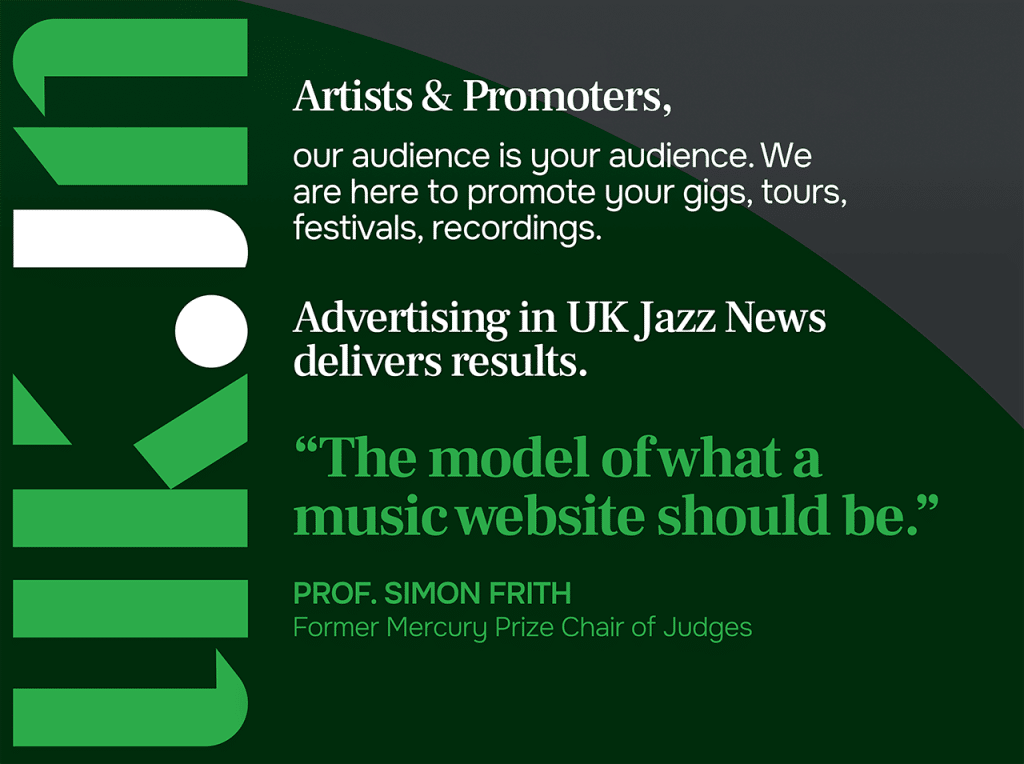The following is an interview between jazz journalist Morgan Enos and trumpeter, composer, arranger, and vocalist Danny Jonokuchi. His new big band album, A Decade, was released 23 August via Bandstand Presents.
Varying track by track, A Decade’s big band is composed of Robert Edwards, Sara Jacovino, and Jason Jackson (trombones); Reginald Chapman (bass trombone); Nick Marchione (lead trumpet); John Lake, Scott Wendholt, Bruce Harris, Sam Hoyt, James Zollar, and Noah Halpern (trumpets); Andrew Gould, Chris Oatts, and Christopher McBride (alto saxophones); Jon Beshay and Chris Lewis (tenor saxophones); Andrew Gutauskas (baritone saxophone); Jeb Patton (piano); Samuel Harris (bass); Kevin Congleton (drums); and Víctor Pablo (percussion).
Links to purchase the album, and to Jonokuchi’s website, can be found at the bottom of this article.
Subtextual as they may be, Danny Jonokuchi’s new album is filled with references to physical calamities. After all, congenital lung disease and a random street attack both gravely jeopardised his prospects in his chosen livelihood. All things considered, it’s a minor miracle that A Decade even exists.
In fact, Jonokuchi is sometimes in awe that, in 2024, his New York big band even exists.
“I think you have to be a little bit nuts [to lead a big band],” he says, “because it can truly be a labour of love. It’s something that you feel you have to do for yourself, or for your community, and put everybody together.”
“But when you get all these people in the same room, and you hear all the horns playing with such precision, it’s something that’s always captivated me,” Jonokuchi adds. “I started leading a big band when I was 18 years old. I’m 34 now, and have no intention of stopping.”
A Decade – a healthy mix of standards (like “On Green Dolphin Street”) and originals (like “South Philly”) – succeeds not only regarding the drama that preceded it, but the jubilation it exudes in spite of it. Read on for a conversation with Jonokuchi.
UK Jazz News: Give us the on-ramp to A Decade.
Danny Jonokuchi: So, A Decade is really about my journey coming to New York. It’s got all of the highs and lows. It’s got all of the drama. It’s got all of the highlights, all in one album.
I also wanted to celebrate the development of the musicians that I’ve been working with. Over the last 10 years in New York, I’ve really wanted to develop these wonderful relationships with some of the greatest improvisers, and also highlight the arrangements that I’ve written over that span of time.
Within that is kind of the story of my time in New York City, which, of course, started with some really bad hangups. Most notably, when I moved to New York I couldn’t really play my horn, and I couldn’t play music at the level that I wanted to, because I had sustained an injury when I was living in Philadelphia.
It was my senior year at Temple University. I was studying with program director Terrell Stafford, and I was coming home one night, and a guy came out of nowhere – I didn’t see him coming – and he socked me right in the mouth.
Terrell was the first person I called on the phone with a bleeding face. I said, “Terrell, as a trumpet player, what do I do?” He immediately said, “Don’t get stitches, because stitches are going to cause permanent scar tissue on the lips.” It took me several months, and pretty much my whole senior year of college as a music major, to heal from this injury.
UKJN: Jesus.
DJ: I can’t thank Terrell enough for being so supportive during that time. He helped rent me a trombone, so I could start buzzing my lips again. He got me a teaching job so that I could practise my teaching chops, and gave me the opportunity to do some arrangements for his band, and some of the recordings he was making. He kept me busy and motivated in doing music, even if I couldn’t play my primary instrument.
That’s actually why I wanted to feature him so much on the second track on the album, “Red Top.” Because he was such an important figure and mentor to me.
Nobody has an easy experience moving to New York City as a jazz musician. Everyone’s got a story, and A Decade is mine.
UKJN: Over those 10 years, how have you seen the New York jazz scene change? I’ve only been around for five or six.
DJ: The biggest thing is the loss of some of the venues. Although new ones have popped up, the scene has changed because a lot of musicians moved away, and a lot of new musicians came. I wouldn’t necessarily say it’s better or worse, but it is starkly different.
For me and a lot of my friends who are big band leaders, it does feel a little bit harder to do big band gigs. The economy of big band music has changed. A big band scene in the city is kind of like a test of its lifeblood; if there’s a thriving big band, that means that great musicians are plentiful there.
It also means that all of those musicians are doing well enough in their personal lives and careers that they can do big band gigs, which typically don’t pay as well. New York still has a couple of venues that highlight big bands, but it is harder than ever to do this music.
So, I really, really commend all of the cats in New York that are doing it. It’s a challenge, but I think it’s one that’s really important. I’m excited that people are still doing it, that records are coming out, that it exists at all.
UKJN: Talk about the concept of your big band.
DJ: All the cats on the record are not only some of my favourite people on the planet, but they’re also my favourite improvisers.
My last record was called Voices, and it featured 11 different vocalists, all based in New York City. That was 12 months ago, and I actually released another big band record between then and now. So, this is my third big band record in the last 12 months.
Obviously, Voices was all about the vocalists. But with A Decade, it’s really about the band, and that means featuring so many different, amazing soloists, but also picking songs that are fun to improvise over.
That was the biggest [mode of] selection, in how I came up with the music. It’s just songs that we love to play at a jam session. Songs we love to play because they have great melodies and really accessible chord changes. People feel like they can really put their own stamp on these songs. That was really important to me.
UKJN: Obviously, your calamities affected you on personal, logistical, and physical levels. But creatively, how did they change you? If this stuff hadn’t happened, how would your artistry and career be different?
DJ: I think the main takeaway is that I hunkered down and focused on writing. I don’t know if I would be the writer I am today if those things hadn’t happened. They really put a focus on the other parts of musicianship that aren’t necessarily playing.
Actually, I’m thankful that they happened, in the end. Because I think they made me a well-rounded musician, and inspired me to explore other parts of music that are important to me.


